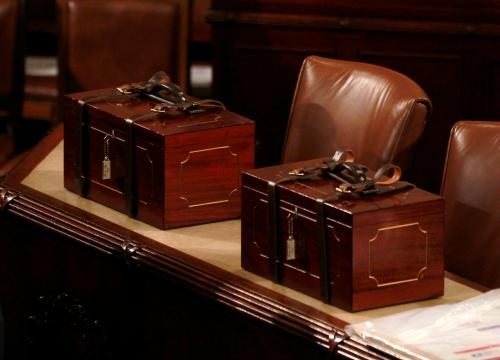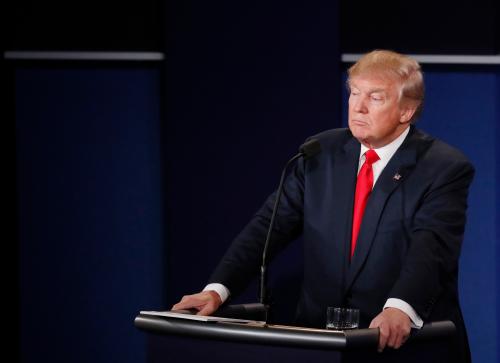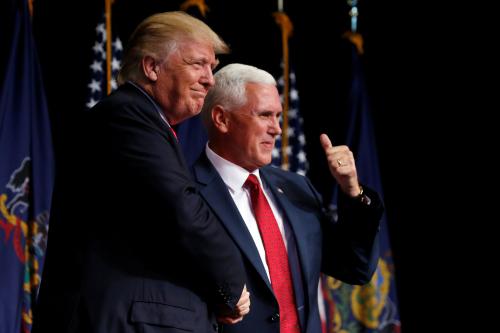You know that we have reached a new low in American politics when the number one question on many American’s minds going into the first presidential debate was: Will Donald Trump do something crazy? But if you ignore the fact that he couldn’t keep his facial tics under control and that he squirmed like a school boy forced to wear a suit and tie for the first time, Trump had a pretty good night. It took nearly fifteen minutes before he started interrupting Hillary. It took nearly 45 minutes before he bizarrely seemed to blow into the microphone. And with the exception of his crack about a hacker being “someone sitting on their bed who weighs 400 pounds”—a comment which will not win him the votes of those afflicted with obesity—he didn’t manage to add any new groups to the long list of those he has insulted in the past. Expectations were low and they were probably exceeded.
Hillary too exceeded expectations. Finally, after one too many long convoluted answers about her private email server, she simply said it was a mistake and stopped talking. She looked good, she smiled a lot. She was smart but not wonky. There were times when she just stood by quietly and let Trump wrap himself up in something. So for her, expectations were high and she too exceeded them.
But perhaps the most important part of this debate was Hillary’s prolonged attack on the heart of Trump’s candidacy, his claim to be a brilliant businessman and therefore qualified to be a brilliant president. Starting with her critique of his economic plan, which she dubbed “Trumped up, trickle down” (a slogan that’s no doubt coming soon to a bumper sticker near you), she struck at the heart of his candidacy. She pointed out that he inherited $14 million from which he built his empire. And then she went to his refusal to release his tax returns. “Why,” she asked “won’t he release his returns?” She suggested that perhaps he is not as rich as he says, or not as charitable. Or that he owes a lot of money to Wall Street and to foreign investors. “We know from documents released in connection with his application for a casino that for a few years he paid nothing in federal income tax,” she went on.
And then she moved on to the heart of the matter. “If your main claim to be president is your business, then let’s look at your business,” she said, before mentioning that there was an architect in the debate hall audience who Trump had refused to pay. “The thousands of people you have stiffed over the course of your business deserve some apology,” Clinton declared. She threw another punch when she brought up the fact that Trump has taken business bankruptcy six times.
The strategy was straight out of George W. Bush’s strategy against John Kerry in 2004. Back then, the heart of Kerry’s candidacy was the fact that he was a certifiable war hero from the Vietnam War. This fact gave him enormous moral power over President Bush who had evaded the draft. Democrats were surprised when Bush sympathizers organized a concerted attack on Kerry’s war record, attempting to cast doubt in the public on whether or not Kerry was, in fact, a true war hero. The attack was stunning in its audaciousness—so much so that the Kerry campaign was way too slow to take it seriously and to counterattack.
What Hillary did tonight was to go to the heart of Trump’s candidacy with a lot more ammunition than the swiftboaters had against John Kerry. His claim that he is a great businessman has fueled his candidacy from day one. If Hillary can take that away from him she will be able to hold onto her lead, sway remaining undecideds, and perhaps even erode some of his support.
This is the best strategy the Democrats have left. Nothing else has worked against Trump. He is proudly ignorant of basic policy. Before the moderator, Lester Holt, lost control of the debate, he did manage to push Trump on exactly how he expects to bring companies back to the United States—a question Trump simply couldn’t answer. Because, of course, he can’t. Noticeably missing tonight was Trump’s insistence on building a wall and making Mexico pay for it—an assertion so ridiculous that someone clearly told Trump to dump that one for the night and save it for rallies of the faithful. Trump also thinks that he can simply repeat things and make them so—such as his insistence that he was against the war in Iraq when him saying the opposite on the Howard Stern show has been played and replayed on television many times.
As his many more serious Republican opponents can attest, conventional thinking doesn’t work against Trump. The only recourse is to go to the heart of his candidacy.
Elaine C. Kamarck is a Senior Fellow at the Brookings Institution and author of Primary Politics: Everything You Need to Know about How America Nominates Its Presidential Candidates. She is a superdelegate to the Democratic convention.






Commentary
In first debate, Clinton goes after the heart of Trump’s candidacy
September 27, 2016